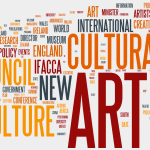
IFACCA is assisting Dr Lidia Varbanova, an international consultant in strategies and entrepreneurship in the arts and creative industries, in her research on International Entrepreneurship in the Arts. As part of the research process, Dr Varbanova has prepared an online survey that can be accessed in English, Spanish and French
This research aims to help arts councils, cultural agencies, ministries of culture and local authorities to find answers to the following key questions:
- How do the national governments, local authorities and diverse stakeholders support arts entrepreneurs, organizations and artists that go beyond national borders with a creative idea that has the potential to earn revenue?
- What are the opportunities, barriers and trends in international entrepreneurship in the arts in different countries? What are effective ways by which arts entrepreneurs expand internationally?
- What are some leading examples of strategic alliances and partnerships in support of international entrepreneurship in the arts in different countries?
- What are some of the success stories of arts entrepreneurs and organizations in different countries and regions of the world? What are the factors that contribute to their success and what are the risks?
- What are the “lessons learned” about how to expand a creative idea internationally?
English https://www.surveymonkey.com/s/CY8BZ7T
French (en français) https://www.surveymonkey.com/s/D77KJ26
Spanish (en español) https://www.surveymonkey.com/s/LZ9FPF7
IFACCA is assisting Dr Lidia Varbanova, an international consultant in strategies and entrepreneurship in the arts and creative industries, in her research on International Entrepreneurship in the Arts. The results of the research will be published (in a modified version to serve students and academic communities) as a chapter in her new book on International Entrepreneurship in the Arts (Routledge, 2016) and as an IFACCA D’Art Report. The survey above has been developed by Dr Varbanova as part of the research process.
The results of the research will be published (in a modified version to serve students and academic communities) as a chapter in her new book on International Entrepreneurship in the Arts (Routledge, 2016) and as an IFACCA D’Art Report.
For the topic page on Entrepreneurship and the Arts please see :
